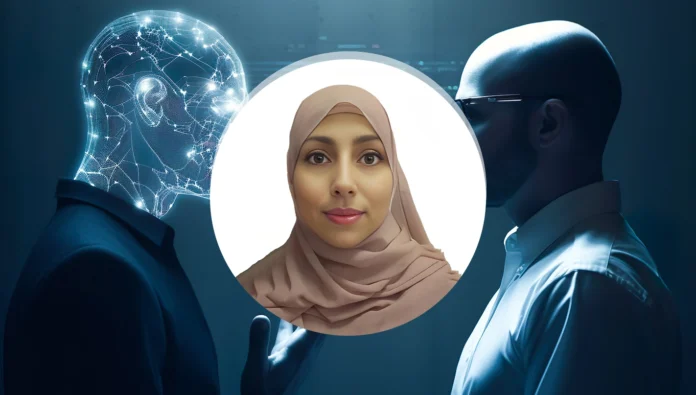Leyla Abdulaziz
The rapid growth of artificial intelligence (AI) is transforming our society and economy, presenting significant challenges such as job displacement and the emergence of an ‘unworking class.’ As machines increasingly outperform humans in various tasks, society must reconsider its roles and responsibilities to ensure that technological progress benefits everyone. This essay explores the ethical dimensions of this AI-driven transformation, emphasizing the need to maintain dignity, purpose, and inclusivity for all, especially for those most affected by these changes.
AI’s swift advancement poses a serious threat to employment. Many jobs, especially those that involve repetitive tasks, are being automated, potentially leading to a significant increase in the number of people who are unable to find work. As machines take over more roles, the number of individuals in the so-called ‘unworking class may grow, posing a challenge to societal stability (Susskind, 2021). This situation raises questions about how society can support those whose jobs are displaced by technology. Maintaining the well-being of individuals impacted by AI requires a multifaceted approach that includes economic assistance and new opportunities for meaningful work.
Work is not just a means of earning a living; it provides individuals with a sense of purpose and social belonging. When jobs become scarce due to AI, this balance is disrupted. An example of this can be seen in the manufacturing sector, where automation has replaced many jobs. Workers who lost their positions faced not only financial difficulties but also a deep sense of loss and detachment from their communities (Benedikt, 2017). It is crucial to reintegrate these individuals into society by addressing both their economic and emotional needs. A Universal Basic Income (UBI) is one solution that has been proposed to provide financial security to those affected by job displacement due to AI.
The concept of UBI, which guarantees a minimum income for all citizens, is gaining traction as a response to AI-induced unemployment. UBI would provide economic security for those who have lost their jobs, allowing them to maintain their basic living standards. Though UBI requires significant financial investment, it presents a morally favorable option compared to leaving people in poverty and suffering the consequences of unemployment (Calsamiglia & Flamand, 2019). UBI, combined with retraining and education, would help individuals transition to new fields less susceptible to automation, thereby preserving social unity and ensuring technological progress benefits all members of society.
Education and retraining are essential tools for preparing individuals for the evolving job market shaped by AI. Retraining programs can help workers develop new skills that align with industries less vulnerable to automation. For instance, a coding boot camp in Silicon Valley successfully transitioned hundreds of workers from manufacturing to tech jobs, demonstrating the transformative potential of targeted education programs (Benedikt Frey, 2020). By focusing on areas where AI cannot easily replace human labor, society can ensure that displaced workers remain competitive and valuable in the future economy.
Additionally, society must recognize the importance of non-economic contributions, such as volunteering and caregiving. These activities, often undervalued in traditional economic terms, play a vital role in fostering community resilience and engagement. During times of crisis, volunteers are essential in relief efforts, and their contributions provide a sense of purpose and belonging for individuals who may not have access to traditional employment (Meier & Stutzer, 2007). Acknowledging the significance of these roles fosters a more inclusive and cohesive society, where individuals can contribute in meaningful ways, even outside of formal employment.
In conclusion, the rise of AI presents significant challenges to the job market, and addressing these challenges requires a comprehensive strategy that supports individuals both financially and emotionally. By implementing measures like UBI, retraining programs, and recognizing the value of non-economic contributions, society can ensure that no one is left behind in the AI-driven future. This inclusive approach not only safeguards the dignity of those displaced by automation but also reinforces the principles of equity and respect. As we navigate the digital age, we must strive to create a society where everyone feels valued, included, and empowered to contribute meaningfully to their communities.
References
Benedikt Frey, Carl. “The Technology Trap: Capital, Labor, and Power in the Age of Automation | Toolkit.” Igualdad.cepal.org, Apr. 2020, igualdad.cepal.org/en/digitallibrary/technology-trap-capital-labor-and-power-age-automation-0
Benedikt, Carl. “The Future of Employment: How Susceptible Are Jobs to Computerisation?” Technological Forecasting and Social Change, vol. 114, no. C, 2 Feb. 2017, pp. 254–280, ideas.repec.org/a/eee/tefoso/v114y2017icp254-280.html.
Calsamiglia, Caterina, and Sabine Flamand. “A Review on Basic Income: A Radical Proposal for a Free Society and a Sane Economy by Philippe van Parijs and Yannick Vanderborght.” Journal of Economic Literature, vol. 57, no. 3, 1 Sept. 2019, pp. 644–658, https://doi.org/10.1257/jel.20181476.
Meier, Stephan, and Alois Stutzer. “Is Volunteering Rewarding in Itself?” Economica, vol. 0, no. 0, 24 Sept. 2007, p. 070924100058002-???, https://doi.org/10.1111/j.1468-0335.2007.00597.x.
Rolf, Steven. “Susskind, Daniel. A World without Work: Technology, Automation and How We Should Respond. Allen Lane:…” ResearchGate, Wiley, Feb. 2021, researchgate.net/publication/349671350_Susskind_Daniel_A_World_Without_Work_Technology_Automation_and_How_We_Should_Respond_Allen_Lane_London_2020_20_336_pages.





